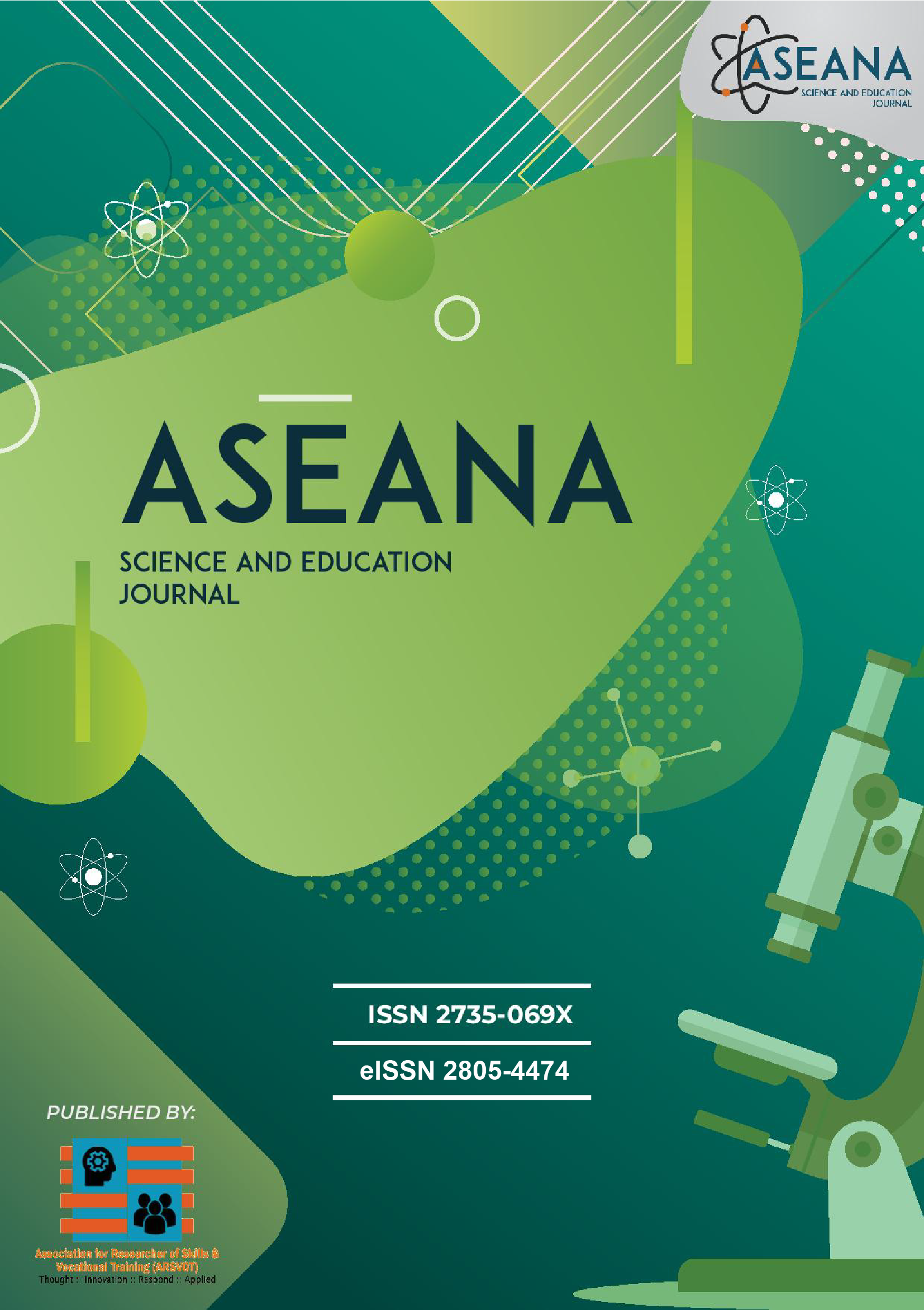Impact of Gender Stereotype on Student’s Self-Concept and Academic Performance in Science
DOI:
https://doi.org/10.53797/aseana.v3i2.4.2023Keywords:
gender, gender stereotype, academic performance, self-conceptAbstract
The main purpose of this study was to determine the impact of gender stereotype on senior high school students’ self-concept and academic performance in science. Employing a descriptive- correlational design, two sets of instruments were used. Part 1 asked the demographic profile of the students, and Part II gathered data on gender stereotype and student’s self-concept. After satisfying the requirement of content validity and internal consistency reliability to gather the needed data from stratified randomly selected 209 Senior High School students in the Municipality of Panitan in the school year 2018-2019. In the analysis and interpretation of data descriptive were used. In the analysis of data, Statistical Package for the Social Sciences (SPSS) was used to process the data gathered, mean and standard deviation were used to describe the overall level of gender stereotype and self-concept of the respondents. The findings revealed that there is significant relationship between gender stereotype and sex, and self-concept and sex.
Downloads
References
Aguilar, L. (2004). Biodiversity: Gender and biodiversity. Retrieved from: https://www.cbd.int/gender/doc/fsgggcbd biodiversity.pdf, Date retrieved: March 25, 2004.
Angelo, R., Dullas, R., (2015). Academic performance and self-efficacy of science High school students. Retrieved from: https://www. research gate .net/ publication/ 25556035376_ academic performance and self-concept, Date retrieved: January 2, 2015
Adepoju, T.L., Oluchukwu, E.E., (2011). A study of secondary school students’ academic performance at the senior school certificate examination and implication for educational planning and policy in Nigeria. Retrieved from: www. Ajol .info. Date retrieved: September 18, 2011.
Baumeister, A., (2018). Self-Concept. Retrieved from: https: //www. Simply psychology. Date retrieved: September 20, 2018.
Bass, B., Goodwin, M., Brennan, K., Pak, R., McLaughlin, A., (2013). Effects of age and gender stereotypes on trust in an anthropomorphic decision aid. Retrieved from: https://journals.sage.pub.com, Date retrieved: February 20, 2013.
Chamorro, T., Furnham, A. (2008). Personality, intelligence and approaches to learning As predictors of academic performance.Date of retrieval: , March 1, 2008Retrieved from Department of Psychology,Goldsmiths, University of London http://ion.uwinnipeg.caEfficacyofFilipino Science High School Students on Mathematics and English Subjects. Date retrieved: November 20, 2008.
Rafei, E., (2008). Relationship between self-concept and academic achievement. Retrieved from:https: // lra. le.ac. Uk/... /2%203 The %20 Relationship %20 between%20Self%5B1%5D.pdf, Date retrieved: October 1, 2008.
Impact of gender stereotype on secondary school students’ self-concept and academic achievement. Retrieved from: https://journals.cagepub.com/doi/ 10. 1177 /2158244015573934, Date retrieved: July 3, 2015.
Irfan, M, and Shabana N.K., (2009). Factors affecting students’academic performance. Retrieved from: https://globaljournals.org/GJMBR_Volume12/3-Factors-Affecting-Students-Academic.pdf. Date retrieved: January 25, 2009.
Isiksal, T., (2010). A comparative study on undergraduate students academic self-concept. Retrieved from: https://scholargoogle.com.ph, Date retrieved: March 3, 2010.
Iza, S. (2017). Gender stereotyping and self-stereotyping attitudes: A large field study of. Retrieved from: http://ftp.iza.org/dp10932.pdf. Date retrieved: September 3, 2017.
Japooweikeye, M.A, (2014). Academic performance of students admitted with different entry certificates to the Nigerian certificate in Education Programme at the Federal college of Education (Technical), OMOKU. Retrieved from: http://www.jotse.org/index.php/jotse/article/view/107/122, Date retrieved April 2, 2014.
Kazmi, S.F., (2011). Parental style and academic achievement among the students. International Journal of academic research. Retrieved from https://scholar.google.com.ph. Date retrieved: September 20, 2018.
Kumari, M., and Mangayarkarasi, B., (2008), Self-concept and academic achievement of students at the higher secondary level. 4 (2013.). Retrived from: https:// www. Research gate. net, Date retrieved: April 1, 2008.
Manning, P., (2007). Self-concept and self-esteem in adolescence. Retrieved from: https://www.uwstout.edu.contentslib. Date retrieved: October 10, 2007.
Kollmayer, M., (2016). Gender stereotypes in education: Development, consequences, and interventions. Retrieved from: https://www. Tand fonline. com/doi /abs/10.1080/17405629.2016.1193483? journal code = pedp 20, Date retrieved: March 27, 2016.
Mega, Q., (2005). Gender roles and stereotypes in education and training. Retrieved from:http://mega.public.lu/fr/publications/publications- ministere/2006/role- femmes-hommes-stereotypes/gender_roles.pdf, Date retrieved: Augus12, 2005.
Naderi, M., (2008). Self-esteem, gender and academic achievement of undergraduate students habibollah. american journal of scientific research ISSN 1450- 223X Issue a 3(2009), pp.26-37 © EuroJournals publishing, Inc. Retrieved from http://www.eurojournals.com/ajsr.htm /pdfs.semanticscholar.org,. Date retrieved: June 1, 2008.
OHCHR, (2014) Gender stereotypes and stereotyping and women’s rights. Retrieved from:https://www.ohchr.org/Documents/Issues/Women/ WRGS/ One Pagers/ Gender_stereotyping. pdf. Date retrieved: April 9, 2014.
Parmar, S., (2011). Self-concept clarity mediates the relation between stress and subjective well-being 10 (4). Retrieved from: https://www.tandfonline.com, Date retrieved: March 4, 2011.
Psychology Program, (2018). What is self-concept theory? A Psychology Explains. Retrieved from: https://positivepsychologyprogram.com/self-concept/, Date retrieved: May 3, 2018.
McLeod, S., (2008). Self concept. Retrieved from: https:// www. simply psychology. Org/ self – concept. Html, Date retrieved: May 23, 2008.
Sebastian, M., Burnett, Z., and Blakemore, N., (2008). Development of the self-concept during adolescent. Retrieved from:https://www.researchgate.net. Date retrieved: October 9, 2008.
Singh, S. and Praveen, T., (2010). The relationship of social maturity with academic achievement of high students. Retrieved from https://www.researchgate.netDate retrieved: November 27, 2018.
Steinmayr, R., (2010). Goal orientations predict academic performance beyond intelligence and personality. learning and individual differences 196-200, doi.org/10.1016/j.lindif.2010.11.026, Date retrieved: December 3, 2010.
Stewart, K., (2010). Effects of classroom physical environment on academic achievement. Retrieved from https://pdfs.semanticscholar.org. . Date retrieved: November 27, 2018.
Super, O., (as cited by Betz, A., 2011). Self-concept theory in career development and counseling. Retrieved from: htpps://www.researchgate.net, Date retrieved: October 19, 2011.
Turner L., (2014). Gender stereotypes and stereotyping and women’s right. Retrieved from: https://orch.orgJgenderstereotypes. Date retrieved: February 3, 2014.
UNESCO (2008). UNESCO’s gender mainstreaming implementation framework Retrieved from: http:// www. unesco. org/ new/ fileadmin /MULTIMEDIA/HQ/BSP/GENDER/PDF/1.%20Baseline%20Definitions%20of%20key%20gender- related%20concepts.pdf. Date retrieved: May 3, 2008.
Ward, A. (2009). Secondary schools science predictors of academic performance in university bioscience subject. Retrieved from: https://scholar.google.com.ph, Date retrieved: January 10, 2009.
Zahra, R., (2010). Relationship between self-concept and academic achievement of female bachelor degree students. Retrieved from: https://scholor.google.com.ph, Date retrieved: May 10, 2010.
Downloads
Published
How to Cite
Issue
Section
License
Copyright (c) 2023 Cheryl Ann F. Gicana, Richel I. Daradar

This work is licensed under a Creative Commons Attribution-NonCommercial-ShareAlike 4.0 International License.



